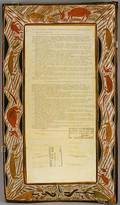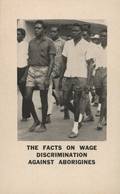Timeline
1960
Soviets criticise Australia
In the United Nations General Assembly, Soviet Union leader Nikita Khrushchev criticises Australia's treatment of its Indigenous population.
International: Lunch counter sit in
In Greensboro, North Carolina, four black students begin a sit-in at a lunch counter, sparking a method of protest that spreads to other segregated public places across America's South.
International: Self-determination
The United Nations Declaration on the Granting of Independence to Colonial Peoples is passed. It argues that 'all peoples have the right to self-determination; by virtue of that right they freely determine their political status and freely pursue their economic, social and cultural development'.
International: Sharpeville massacre
In South Africa, 69 black demonstrators are killed and at least another 180 are injured when police at Sharpeville open fire on demonstrators protesting against the 'pass' laws that required black South Africans to carry passbooks showing they had permssion to live or move around in 'white' areas of South Africa. A state of emergency is declared, and both the African National Congress and Pan-African Congress are banned.
International: Vote gained in Canada
In Canada, Aboriginal people gain the right to vote in federal and provincial elections.
International: Africa decolonises
Decolonisation of African nations begins in the 1950s but rapidly gains pace in the 1960s.
1961
Menzies defends apartheid
As South Africa leaves the British Commonwealth to avoid expulsion over its apartheid laws, Prime Minister Menzies publicly defends South Africa's right to pass such laws.
International: United States freedom rides
'Freedom rides' take place on buses through America's South in order to challenge racial segregation.
Assimilation policy adopted
A meeting of federal and state ministers responsible for Aboriginal welfare agrees on a policy of assimilation, as defined by the Minister for Territories, Paul Hasluck.
Federal Council for Aboriginal Advancement against apartheid
At the Federal Council for Aboriginal Advancement meeting in Brisbane the Aboriginal delegates move that 'we must abolish apartheid in our own country before the next Prime Ministers' Conference, or we may find ourselves in a similar position as South Africa this year.'
International: New nations
By 1961, 17 new African nations have been admitted into the United Nations. The representation of Asian nations has grown to 20, making the Afro-Asian group the largest voting bloc in the UN.
1962
National petition campaign
The Federal Council for Aboriginal Advancement (FCAA) launches a national campaign for a referendum to change the Constitution. From 1964 various proposals for constitutional amendment are debated until the government led by Harold Holt finally agrees in February 1967 to hold a referendum.
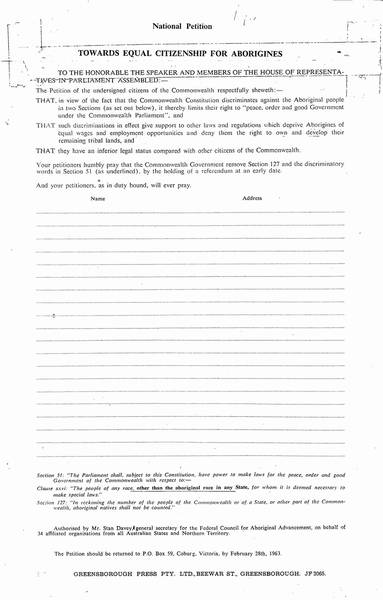
Source: Council for Aboriginal Rights (Vic.) Papers, MS 12913/11/5, State Library of Victoria
Federal voting rights
Aborigines and Torres Strait Islanders receive the right to vote in federal elections.
1963
Bark petition sent
The Yolngu people of Yirrkala send bark petition to Canberra. The petition is signed by nine representatives of the various clan groups with interest in the land under threat from mining.
International: 'I have a dream'
In April, Martin Luther King is arrested during a protest in Birmingham, Alabama. In August, Martin Luther King delivers his famous 'I have a dream' speech to more than 200,000 protestors at the March on Washington.
1964
New social welfare regime
The Northern Territory Social Welfare Ordinance 1964 gives the Director of Social Welfare power 'over persons who in the opinion of the Director are socially or economically in need of assistance'. Previously all but a few Aboriginal Territorians had been classed as 'wards of the state'.
International: Peace prize
Martin Luther King receives the Nobel Peace Prize.
International: Mandela gets life
In South Africa, Nelson Mandela is sentenced to life imprisonment for sabotage and attempting to overthrow the South African government.
International: Discrimination law passed
In July, America's President Lyndon Johnson signs the 1964 Civil Rights Act, prohibiting discrimination based on race, colour, religion or national origin.
1965
Queensland rights to vote
The Queensland Aborigines' and Torres Strait Islanders Affairs Act finally removes the barriers prohibiting an 'aboriginal native of Australia or the Islands of the Pacific' from voting. However barriers, for some people, remain. Many of the 110 regulations under the Act continue to override or ignore Aboriginal and Islander human rights.
International: Race violence in US
In February, Malcolm X, founder of the Organization of Afro-American Unity and prominent member of the Nation of Islam, is murdered.
In August, 34 people die after riots and looting erupt in Watts, California, an area in Los Angeles of extremely high black unemployment and poverty.
International: Black voting rights
In August, America's President Lyndon Johnson signs the 1965 Voting Rights Act, removing the restrictions which made it difficult for Southern blacks to register to vote.
Australian freedom ride
The University of Sydney's Student Action for Aborigines arranges a 'Freedom Ride' through western New South Wales towns to bring to public attention the inequities and racial prejudice faced by Aboriginal people. The students' action is widely publicised. Charles Perkins, the Aboriginal leader of the Ride, is widely recognised as a direct and forceful Aboriginal spokesman.
Equal wages campaign
The campaign for equal wages for Aboriginal pastoral workers begins. The North Australian Workers' Union lodges an application for the Cattle Station Industry (Northern Territory) Award to include Aboriginal pastoral workers.
1966
New prime minister
On 26 January Harold Holt takes over as Australia's seventeenth Prime Minister.
Equal wages awarded
In March Aboriginal pastoral workers are awarded equal wages, but the industry is not required to comply until December 1968. In August Vincent Lingiari leads more than 80 stockmen and their families in a walk-off at Wave Hill station.
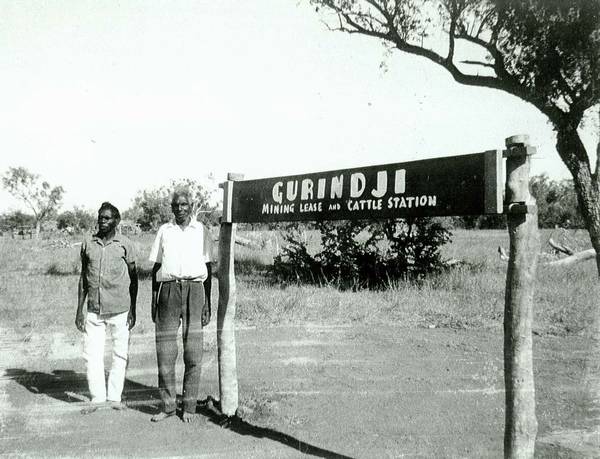
This was probably the first time Gurindji people had seen their name for themselves written down.
Source: National Archives, of Australia, Darwin
International: Black power movement emerges
The Black Panther Party is founded by Huey Newton and Bobby Seale.
Stokely Carmichael of the Student Nonviolent Coordinating Committee (SNCC) coins the term 'Black Power'.
1967
27 May referendum
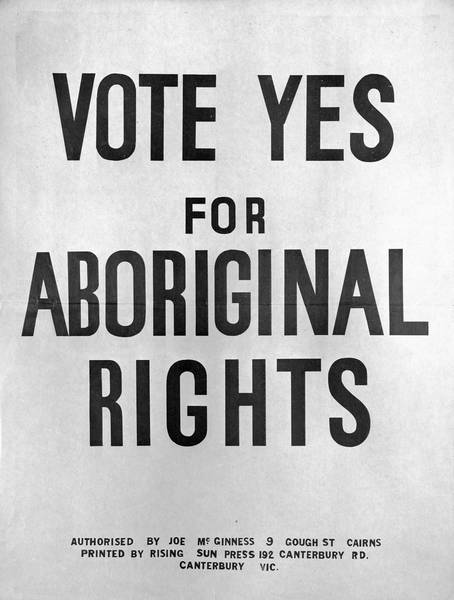
Source: Gordon Bryant Papers, 1917-1991, MS 8256/11, Box 175, National Library of Australia
An overwhelming majority (90.77%) of Australians vote to amend the Australian Constitution by deleting section 127, and amending clause 51 (xxvi). This is the culmination of a decade-long campaign for these changes.
1968
National land rights campaign
The Federal Council for the Advancement of Aborigines and Torres Strait Islanders (FCAATSI) decides to launch a national campaign for Aboriginal land rights. Abschol actively supports the campaign and a petition is drawn up and circulated widely.
Land rights march in Melbourne, 1968
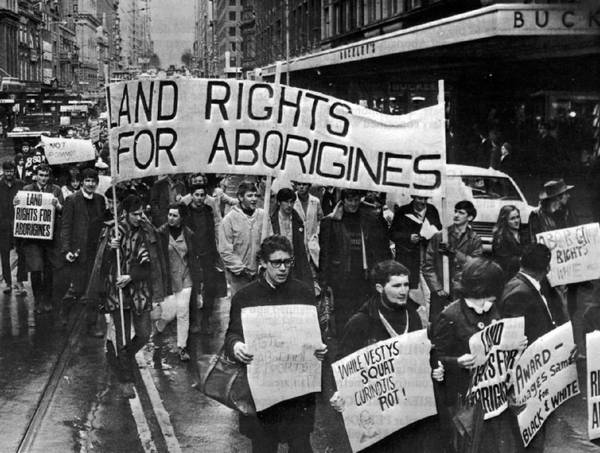
Students, Aboriginal activists and others respond to Cabinet's refusal to make tribal lands available to the Gurindji of Wave Hill.
Source: Courtesy Melbourne Sun, 13 July 1968
